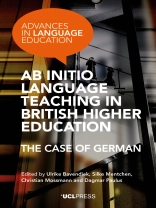Drawing extensively on the expertise of teachers of German in universities across the UK, this volume offers an overview of recent trends, new pedagogical approaches and practical guidance for teaching at beginners level in the higher education classroom. At a time when entries for UK school exams in modern foreign languages are decreasing, this book serves the urgent need for research and guidance on ab initio learning and teaching in HE. Using the example of teaching German, it offers theoretical reflections on teaching ab initio and practice-oriented approaches that will be useful for teachers of both German and other languages in higher education.
The first chapters assess the role of ab initio provision within the wider context of modern languages departments and language centres. They are followed by sections on teaching methods and innovative approaches in the ab initio classroom that include chapters on the use of music, textbook evaluation, the effective use of a flipped classroom and the contribution of language apps. Finally, the book focuses on the learner in the ab initio context and explores issues around autonomy and learner strengths. The whole builds into a theoretically grounded guide that sketches out perspectives for teaching and learning ab initiolanguages that will benefit current and future generations of students.
Spis treści
List of figures and tables
List of contributors
Glossary and list of abbreviations
Foreword by Martin Durrell
Editors’ introduction
Part I: Trends and developments
1 Beginners German: Ja, bitte! Development and status quo of German ab initio education in degree programmes and language centres at UK universities
Martina Wallner and Elisabeth Wielander
2 German ab initio in Languages for All programmes: Student profiles and course design
Sabina Barczyk-Wozniak
3 Preparing Generation Z students for a world of volatility, uncertainty, complexity, and ambiguity (VUCA) through language learning
Kasia Łanucha and Alexander Bleistein
Part II: Pedagogy and teaching methods
4 Reading literature in the ab initio classroom
Daniela Dora and Katharina Forster
5 Using music in ab initio courses
Kirsten Mericka
6 Grammar teaching and learning in the German ab initio classroom
Birgit Smith
7 Selecting the right resources for beginners level: A textbook evaluation
Christian Mossmann
8 Intercultural awareness in the teaching and learning of German: The case of ab initio Eva Gossner and Dagmar Paulus
Part III: Innovative approaches
9 The ‘flipped classroom’ approach in the German beginner context
Mandy Poetzsch
10 New approaches to feedback in ab initio language classes: a case study
Ruth Winter
11 Two for the price of one: Using a cognitive theory of metaphors for vocabulary teaching and learning
Silke Mentchen
12 Effective vocabulary learning apps: What should they look like? An evaluation with a particular view to German language acquisition
Annemarie Künzl-Snodgrass, Theresa Lentfort and Maren de Vincent-Humphreys
Part IV: Learner focus
13 Developing learner autonomy in German ab initio programmes
Thomas Jochum-Critchley
14 Individual Differences in ab initio language learning: Working with learners’ strengths
Ulrike Bavendiek
O autorze
Dagmar Paulus is Lecturer and Language Coordinator in German Studies at University College London where she is responsible for the German ab initio programme. Previously, she taught German at the University of Nottingham and at Tomsk State University, Russia. Her latest book, Nationalism before the Nation State, was published in 2020. Her current research project is a monograph on landscape and nationalism.












